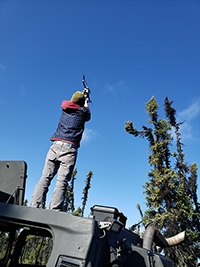Environmental Site Assessment Technician Program: Healing the Land

Becoming a Land Guardian was a natural development for Wyatt Adair. As a child, Wyatt – a member of the Fort Nelson First Nation – spent a lot of time on the family land in the nearby mountains.
“My grandma always taught me to take care of it,” says Wyatt. “[She’d say] the land is still here and still looks great, the river is still flowing, the trees are growing – and you can keep coming here as long as you take care of it. And that’s the role of the Guardians.”

As a Land Guardian, Wyatt joined a crew that takes care of the land in a more formal manner, with activities such as water sampling and maintaining climate stations throughout the territory. The Fort Nelson First Nation Land Guardians help their Nation in many ways, but it was the desire to build capacity in their environmental work that led the Nation to support the development of an Environmental Site Assessment Technician program.
“We have a lot of environmental damage from the oil and gas industry, so the Nation is keen on doing training and projects that can help with restoration work throughout the territory,” explains Marilyn Norby, Field Coordinator for the Fort Nelson First Nation.
That interest led to a partnership between the B.C. Oil and Gas Commission and Northern Lights College, along with funding from the Ministry of Post-Secondary Education and Future Skills, to develop the Environmental Site Assessment Technician program. The nine-month program covered a variety of topics, such as how to conduct environmental site assessments; investigate environmental issues; collect samples from surface and ground water and soil; land and water remediation; and reclamation and monitoring.
While the Fort Nelson First Nation was a developing partner, the course was also offered to members of Treaty 8 Nations and other Nations in northern B.C.
“Restoration of former oil and gas sites is a priority for the Commission, and we’re seeing a dramatic increase of the number of wells plugged and decommissioned,” explains Sara Dickinson, Executive Lead, Reconciliation and Community Engagement with the B.C. Oil and Gas Commission. “To fully restore the land, we need the traditional knowledge, skills and support of Indigenous People. This training program ensures that expertise is maintained in the restoration economy.”
Because classroom training was offered online due to the COVID-19 pandemic, the participants had to work through the challenges of using technology for remote learning and maintaining isolation requirements. Despite these challenges, they still completed their program requirements, including the numerous fieldwork practicums.
One of those was with the B.C. Wildlife Federation’s Wetlands Workforce. The Wetlands Workforce is a collaboration between conservation organizations and First Nations that deployed work-pods across B.C. during 2021 to improve riparian habitat.
“We worked with BC Wetlands Workforce collecting wetland data and doing site assessment,” says Wyatt. “We learned to ensure all the data needed was captured, such as photos, PH levels., etc. We learned how [the data] works together and why we’re collecting it. Another project about site restoration taught us about digging out contaminated soil and why we do it a certain way.”
Wyatt says these mentorships were particularly valuable. “These instructors were people who are on the ground, people who are actually doing the work,” he says. “It was helpful to hear those different points of view. You may know a lot, but there’s always someone who knows something else.”
Graduates of the Environmental Site Assessment Technician program received university-level credits that they can choose to transfer to other education programs. Wyatt has not decided if he is going to do that just yet, but he did accept a new position with the Fort Nelson First Nation’s Lands and Resources Department as a Data Management Assistant.
The position is less work in the field and more in the office, but it is still work taking care of the precious land that makes up the traditional territory of Fort Nelson First Nation.
The Ministry of Post-Secondary Education and Future Skills has invested $15 million to help Indigenous communities manage the economic impacts of COVID-19. The skills training funding goes to Indigenous training partners throughout B.C. to address COVID-19 recovery in the workforce.






